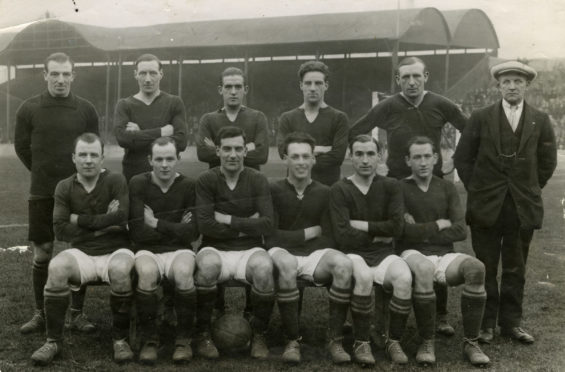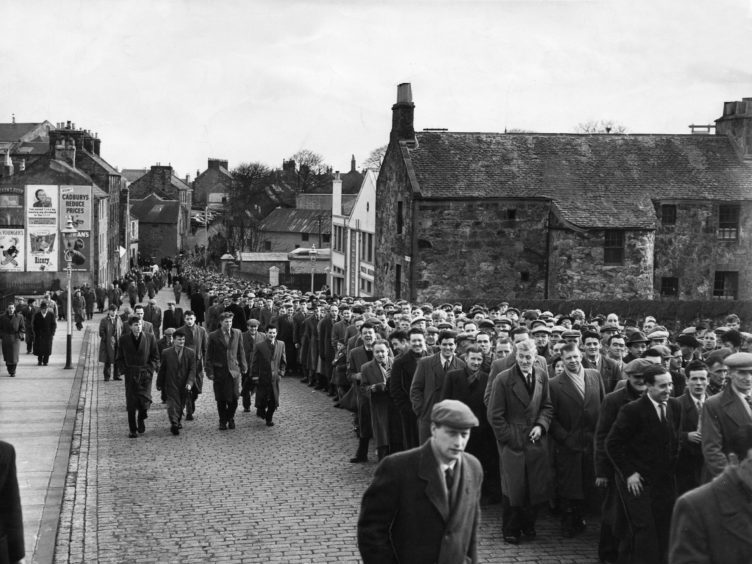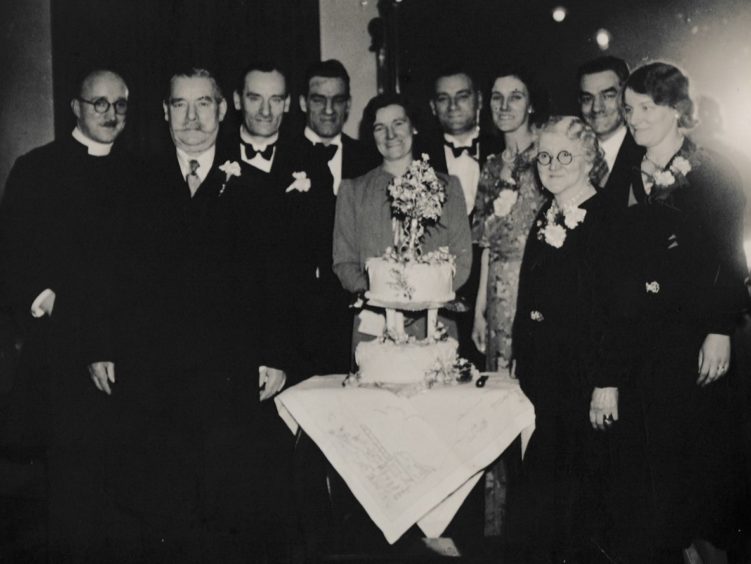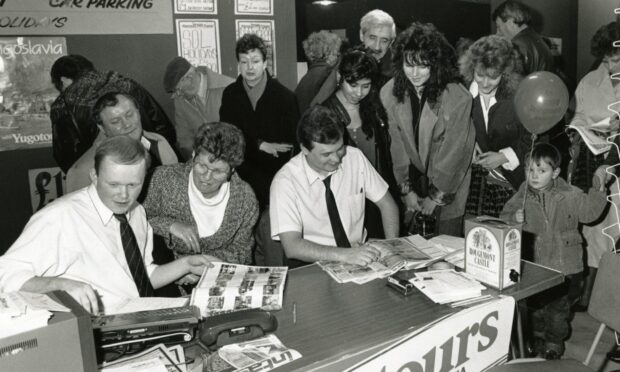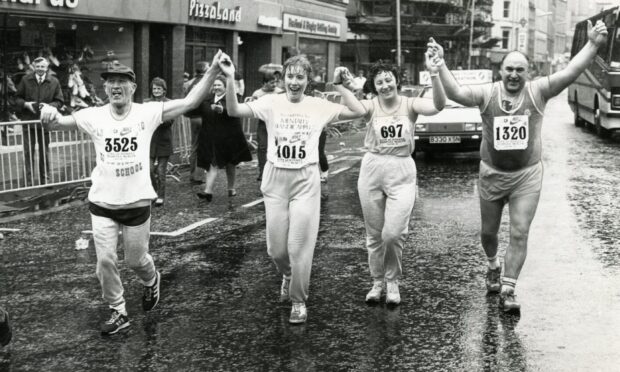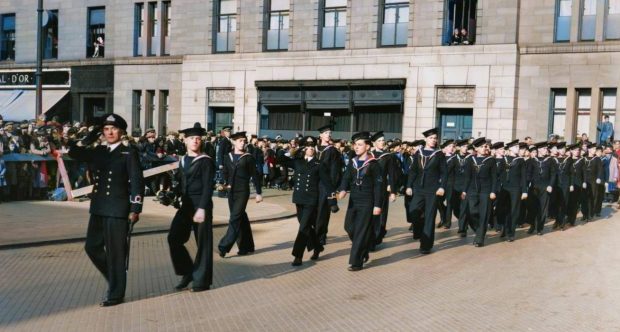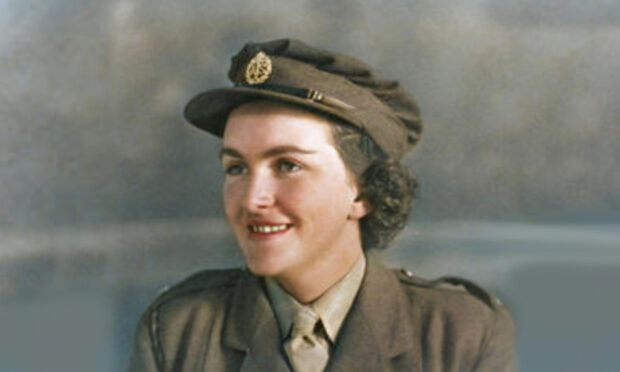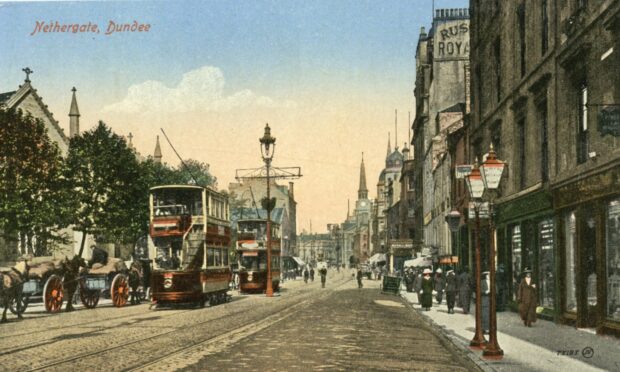He was the shipwrecked Raith Rovers football hero who was “probably the best Scottish striker never to play for his country”.
Tom Jennings made 196 appearances and scored 127 goals at Stark’s Park before going on to break scoring records in England including a straight hat-trick of hat-tricks in the English First Division with Leeds United.
White Hart Lane
Jennings was Leeds’ first goal machine and the pre-war phenomenon is still the club’s fourth highest goalscorer of all time, behind Elland Road legends Peter Lorimer, John Charles and Allan Clarke.
Tom Jennings, a Leeds United player that deserves greater recognition. Better goals to game ratio than Charles, Lorimer and Clarke. 117 goals in 174 appearances. A hat-trick in three successive matches, 35 goals in one season. 3rd highest ever league goalscorer for #lufc pic.twitter.com/SmGjH7Dcg3
— clive howard miers (@clivemiers) April 27, 2020
He might have scored even more if he had not suffered with attacks of blood poisoning.
Jennings was born in 1902 in Strathaven and made his name with Cadzow St Annes, a junior football team from Hamilton in Lanarkshire.
His progress was not unnoticed and in 1919 he was invited down to London for a trial with Tottenham Hotspur but nothing materialised and he signed for Raith Rovers in January 1921.
He made his Raith Rovers debut in the Jock Rattray benefit match on the day he signed and his performance was good enough to retain his place when four days later they played Aberdeen in a league game.
Raith won the match 1-0 with Jennings scoring in front of a crowd of 8,500 and he went on to become a first-team regular.
In all, he started 23 games from January 1921 and scored nine goals before he made 44 appearances the following season that would turn out to be the team’s greatest-ever final league position when they finished third behind Celtic and Rangers.
Jennings scored 25 in all games including the only goal of the game against Rangers at Ibrox and his first ever senior hat-trick which was away from home against Clydebank in a 5-0 win.
As one of the leading teams in Scotland, Rovers were invited to tour Denmark where they played three matches in Copenhagen which was the start of the team going on foreign tours.
Shipwrecked in Spain
In season 1922-23, Jennings played 42 games and scored 18 goals and Raith finished the season in ninth place before the team famously became shipwrecked on Scottish football’s most bizarre pre-season tour.
They took up the offer to play a handful of friendly matches on the Canary Islands but problems arose in the Bay of Biscay on the Sunday morning during a violent storm when the captain of the passenger ship struck rocks off the Spanish coast.
Many passengers were still in bed when the command was made to don lifebelts and abandon ship and the team spent three days of “trials and difficulties” before they finally reached the Canary Islands where they played in the middle of wire-clad bullrings.
Jennings was the top scorer during the tour and was also the stand-out performer in the hotel bar in Las Palmas during the tour when his team-mates suggested he was good enough to join the Carl Rosa Opera Company.
Club captain Bill Inglis sent a telegram home to The Courier from the Hotel Metropole following the performance by Jennings and chairman Mr Adamson.
“They have a casino here but it was closed down a fortnight before we arrived,” he said.
“I understand that someone had gambled away a fortune that didn’t belong to him and the new governor of the island had it closed down, at least for the time being.
“Two days ago we had a smoking concert organised by a native of Edinburgh, Mr Kelly by name, who officiated at the piano.
“Our chairman, Mr Adamson, sang ‘My Old Shako’ and ‘Tommy Lad’.
“The big successes of the evening were our hidden talent, Tom Jennings and Mr Stewart, who is travelling with us on a holiday.
“Tommy gave us ‘The Rosary’ and some of the boys suggested that he should be with Carl Rosa.”
Raith Rovers club historian John Greer said it was “incredible” that Jennings never received international recognition despite his goal-getting exploits.
He said: “He then continued his scoring run going into the 1923-24 Scottish League Division One championship and on October 6 1923, he scored four goals in a 6-1 win at Stark’s Park against Third Lanark in front of a crowd of 7,000.
“At the end of the season, it was reported that Millwall made an offer of £50,000 for the whole of the Raith Rovers’ forward line of Bell, Miller, Jennings, James and Archibald.
“In Tom Jennings’ last season with Raith Rovers he played 23 games and scored 23 goals, scoring two further hat-tricks.
“Tom had seen Rovers’ players David Morris and Bill Collier both capped by Scotland and other team-mates transferred to clubs in England.
“When that season, Sheffield Wednesday played Leicester City both team captains were former Raith players, Bill Inglis and John Duncan.
Reluctantly sold
“On the 20th of March 1925, Tom Jennings was reluctantly sold to Leeds United for £3,000 which was quite a return for the £10 that Raith Rovers had paid to his junior club for his services four years earlier.”
Here's my offering for @RuaridhKilgour #RetroChallenge @RaithRovers 54 shirts with some more since pic.twitter.com/fVxZZQ7vpi
— John Greer (@johnhngreer) April 4, 2020
“LEEDS UNITED SECURE A CRACK CENTRE – ONE OF THE BEST IN THE SCOTTISH LEAGUE”, was how the Yorkshire Evening Post reported the signing of Jennings on the back page.
A correspondent in Glasgow sent a telegram to the newspaper in which he claimed Jennings was regarded as one of the cleverest centre-forwards in Scotland and his wonderful knowledge of the game and everything he did made him a master craftsman.
Jennings was the first player to sign for Leeds directly from Scotland and scored his first goal against Liverpool at Elland Road.
By the end of a campaign, in which Leeds largely struggled, Jennings had scored three goals in 10 games whilst his partner Russell Wainscoat got four in nine.
The following season he scored 26 goals in England’s top flight including his first hat-trick in United colours against Arsenal in February 1926.
Leeds escaped relegation by a single point despite his goals.
Jennings continued to score goals in a struggling team and they were finally relegated in the 1926-27 season.
He scored 35 times including 22 goals in just 14 games between September 4 and November 20 which included a hat-trick against Arsenal at Elland Road.
A week later he went one better by scoring four at Anfield in a win over Liverpool.
Another four-goal haul followed when Blackburn Rovers were thrashed at Elland Road, making it three hat-tricks in three games.
This was the first time in the history of top flight football, in England, that this magnificent feat had been achieved.
Jennings remained at the club and fired Leeds back into the top flight at the first attempt.
He scored 21 times over a season in which he suffered from blood poisoning which restricted him to just 51 games over the next three seasons.
Curtain call
His final Leeds United goal came in his 170th appearance, at home to Sheffield Wednesday, which was the 117th time that he had put the ball in the net in a Leeds shirt.
Jennings left Elland Road in June 1931 to join Chester City where he continued to break scoring records.
He officially scored Chester’s first ever Football League goal in a 1–1 draw with Wrexham in September 1931.
Also on this day in 1932, Tom Jennings, the Chester centre-forward, scored FIVE goals against the sorry Saddlers in our Third Division North clash. We lost 5-1 but soon gained our revenge as we trounced Chester 5-0 the following year.
Anyone attending games in 1932??
— Saddlers Stats (@saddlersstats) January 30, 2019
Although Chester had beaten Wigan Borough 4-0 four days earlier, the result was deleted after Wigan resigned from the Football League in October 1931.
Later in the season he scored Chester’s first Football League hat-trick, when he scored all the club’s goals in a 5–1 win over Walsall in January 1932.
He later managed Bangor City, who he joined in 1933, and Third Lanark from 1934 until he resigned in 1938.
Jennings fought in the Second World War and his return to Europe – well over a decade after he was shipwrecked in Spain – appears to have been just as dramatic.
There were reports at the time from a newspaper in Chester which suggested he spent a few years in a German prisoner of war camp after being captured by the Nazis.
Love affair
Marc Bracha who runs the Leeds United nostalgia site Sheridan Dictates said: “In today’s football, there would be no way Leeds would have been able to keep hold of their deadly marksman following relegation but the love affair was not about to end.
“Jennings remained at the club and fired Leeds back into the top flight at the first attempt.
“Incredibly, the master craftsman never received international recognition during his career but despite that, the man signed from Raith Rovers was box-office.
“His exploits of 117 goals in 174 games makes him the fourth highest Leeds goal scorer of all time, behind Peter Lorimer, John Charles and Allan Clarke.”
Jennings time at Leeds was celebrated when his picture was on the front of the match programme to celebrate the club’s centenary.
The Elland Road club described Jennings as “probably the best Scottish striker never to play for his country”.
Jennings was the great-uncle of Sheila Stewart and she said the family are hugely proud of his achievements in football.
“Tom was one of nine children and he was from a very musical family,” said Sheila, who is originally from Nairn, but now lives in Glasgow.
“I first met him in April 1967 when Aberdeen got to the Scottish Cup Final.
“I supported Aberdeen and I was going through to Hampden and I remember my mum told me to get in touch with my Uncle Tommy.
“He was working at the time as a sportswriter with the Daily Record and the Sunday Mail alongside Jerry Dawson who was the former Rangers goalkeeper.
“I went to the Daily Record office and I discovered he was a classic, nice, warm Glasgow man and we had a really good chat.
“He gave me tickets for the press box for the cup final and did the same when Aberdeen reached the final again a few years later.
“My family never really talked about Tom’s football achievements and it was only 10 years ago that I discovered what a career he enjoyed in the game.”
Huge source of pride
She said the family is hugely proud of his legacy and those stories have now been passed down through the generations to keep his memory alive.
“He gave so much pleasure to the fans of Raith and Leeds and that’s a source of huge pride,” she said.
“Just as important is what kind of man he was.
“We’ll never forget him.”
Jennings, who was married to Jean and stepfather to Pam, died in Johnstone in July 1973 at the age of 71.
He still had a broad Scottish accent despite all his years in England.
